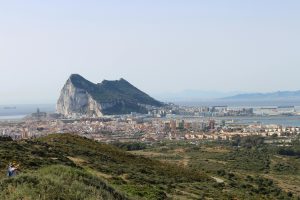By John David
Introduction
The process of recognising the citizenship of Moroccan Gibraltarians has been slow, partial, and rooted in discrimination.

Fifteen years after the publication of a report exposing Gibraltar’s immigration system as a ‘shabby regime of legal discrimination’[1], my research reveals the long-term consequences of anti-settlement policies, even with the belated granting of British-Gibraltarian citizenship to Moroccan workers.
During the summer of 2023, I spent three weeks conducting research with both Moroccan Gibraltarians and the organisations that support them. My research found that naturalisation has not erased the legacies of exclusion, with a lack of access to adequate housing and the forced separation of family members persisting as key issues affecting the Moroccan-Gibraltarian community. Whilst this case study is singular, my research also provides broader insight into the long-term impact of anti-settlement policies upon the well-being of naturalised immigrant communities.
A Workforce That Sustained Gibraltar, Yet Was Denied Belonging
In 1969, General Franco closed the border between Gibraltar and Spain, cutting off 4,600 Spanish workers and threatening Gibraltar’s economy. In response, Gibraltar turned to Moroccan labourers, who were recruited in large numbers from cities such as Rabat, Tangiers, and Tetouan. By 1970, nearly 3,000 Moroccans had made the short but life-changing journey across the Strait.
Despite their crucial role in Gibraltar’s economic and political survival, these workers were granted only renewable one-year residency permits, with no path to permanent settlement. Strict immigration laws prevented family reunification, and until 1986, Moroccan mothers were forced to return home at seven months pregnant to give birth. After the border with Spain fully reopened in 1985, Moroccan workers faced another blow: anyone unemployed for six months became liable for deportation, regardless of their prior contributions to Gibraltar. The citizenship applications of Moroccan Gibraltarians that remained, including those of tax-paying residents for over forty years, continued to be arbitrarily rejected up until the second decade of the 21st century.
Legacies in Access to Housing

Today, the majority of the ‘original workers’ now hold dual citizenship as British Gibraltarian and Moroccan, but the legacies of strict anti-settlement policies linger. Many elderly Moroccans who helped sustain Gibraltar still live in overcrowded and unsafe housing in the Upper Town. Excluded from public housing for decades (Gibraltar’s affordable housing scheme is only open to citizens), they were pushed into rent-controlled accommodation. As a 2019 Environmental Agency report revealed[2], this often lacked basic facilities such as toilets, showers, and kitchens. Although naturalised Moroccans can now apply for government housing, many remain at the bottom of long waiting lists, and despite their decades of residence, are still living in squalor in Gibraltar’s Upper Town.
Legacies of Forced separation

The forced separation of families also remains an unresolved issue. Many naturalised Moroccan Gibraltarians have spouses and children still in Morocco, unable to join them due to past deportations or restrictive immigration policies. Those who remain in Gibraltar in order to access pensions and healthcare often live alone, ageing in isolation, unable to reunite with their families. Their dilemma is thus two-fold: Gibraltar maintains its own Immigration Law which lacks any comprehensive regime for family reunification, but through their dependency upon accessing healthcare and pensions in Gibraltar (which they cannot currently do if they return to Morocco) senior citizens are also effectively ‘tied’ to residence upon ‘The Rock’.
A Local Story with Global Relevance
As is seen in the case of the Moroccan workers of Gibraltar, the rightful granting of legal equality through a passport does alone not erase decades of discrimination, nor does it undo the economic and social precarity that many migrants continue to face. Moroccan workers first came to Gibraltar at the request of the British Government and for decades their labour was instrumental in the construction of modern Gibraltar. Yet many have been left to grow old in poverty and isolation despite living in one of the world’s wealthiest economies. Their ongoing struggles for family reunification and improved living conditions provide a stark reminder that citizenship alone does not guarantee justice or equality. The enduring effects of anti-settlement policies rather continue to shape the lived experiences of naturalised citizens long after formal legal recognition has been granted.
It is well-documented within migration studies that ‘guest-worker’ schemes can lead to exploitation. From the mistreatment of Central-Asian workers under the UK Seasonal Worker Scheme to the appalling working conditions for South Asian labourers across the Gulf, migrant labourers sustain economies whilst being denied full membership in society. As a result, they are often left vulnerable to underpayment, poor living conditions, unfair dismissal and deportation. However, a lack of research concerns the long-term impacts of anti-settlement policies for guest-workers who do eventually gain citizenship through naturalisation.
The Gibraltarian context provides valuable insight into potential directions for such research. For one, the gendered dimensions of these long-term impacts warrant closer attention. After all, whilst most of the original ‘guest-workers’ in Gibraltar were men, many were later joined by spouses who faced unique challenges, such as being forced to return to Morocco during pregnancy. Historically, NGOs such as the ‘Moroccan Workers Association’ also played a central role in representing Moroccan ‘guest-workers’ in Gibraltar, but my research indicated that the civil society landscape in Gibraltar had become increasingly fragmented following higher rates of naturalisation in the past decade. Future research into the long-term effects of anti-settlement policies, both in Gibraltar and beyond, should explore how the role of advocacy organisations evolves, as their focus shifts from securing basic rights for ‘guest-workers’ to achieving more complex goals of social and economic equality for naturalised citizens.
Researcher’s Background
I am a 2024 Geography graduate from the University of Oxford. The research on which this blog is based was conducted as part of my undergraduate dissertation. Since graduating, I’ve been pursuing professional experience in think tanks and am currently interning as a research associate at the Global Research Network. I was drawn to The Research Centre on Peripheral Populations for its commitment to producing research with impact, and especially its expertise in immigration justice—the focus of this blog. Looking ahead, I hope to further contribute to the Centre’s work, advancing our understanding of peripheral populations and addressing the systemic barriers that hinder true equality.
References:
[1] Blackburn, D., Ewing, K. and Jeffrries, J. (2009). Human Rights Annual Report 2008– Foreign Affairs Committee. Available at: https://publications.parliament.uk/pa/cm200708/cmselect/cmfaff/557/557we49.htm (Accessed 26th January 2025)
[2] GBC News (2020). #GBCviewpoint on housing problems (part 1 of 2). 28 February. Available at: https://www.youtube.com/watch?v=izdEt98Fl7g. (Accessed 20th January 2025).

Excellent article. Thank you for raising and exposing these issues. The may the Moroccan community are treated is a continued shame on Gibraltar.
At last an academic and well-researched insight into the discrimination faced by members of Gibraltar’s community. Much more needs to be done in Gibraltar to bring true equality and justice to people who after decades of living and working here are not migrants, not guest workers but part of the community. This article helps bring this matter to the fore; I hope there are more to come.